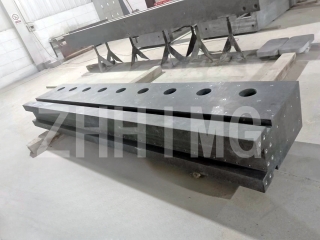Granite bases are a popular choice for CNC machine tools due to their excellent damping properties, high stiffness, and thermal stability. However, not all granite is created equal, and there are several factors to consider when choosing a granite base for your CNC machine tool. In this article, we'll explore some of these key factors to help you make an informed decision.
1. Granite type and quality
Not all granite is suited for use as a machine tool base. Some types of granite may have natural defects or inclusions that could reduce their mechanical properties. Additionally, the quality of the granite can vary depending on the quarry where it was extracted and the manufacturing process used to produce the base. It's important to choose a high-quality granite with a uniform texture and without any cracks or defects to ensure the best performance of your CNC machine tool.
2. Dimensional accuracy
The dimensional accuracy of the granite base is critical for maintaining the precision of the CNC machine tool. The base must be machined to a high degree of accuracy to ensure that it aligns perfectly with the machine's other components. Any deviation from the required tolerance can cause misalignment, reduced accuracy, and premature wear and tear of the machine.
3. Surface finish
The surface finish of the granite base is also important. Any irregularity or roughness on the surface can cause friction and reduce the accuracy of the CNC machine tool. The surface finish should be smooth and free of any bumps or rough patches.
4. Bonding agent
The bonding agent used to attach the granite base to the machine frame is an important factor in the performance of the machine. The bonding agent should be strong enough to hold the granite securely in place but also flexible enough to allow for slight movements due to thermal expansion and contraction. If the bonding agent is too rigid, it can cause stress and ultimately damage the granite base or the machine frame.
5. Heat dissipation
One of the advantages of using a granite base is its ability to dissipate heat effectively. Heat generated by the machine tool or the workpiece can cause thermal expansion, which can affect the accuracy of the machine. The granite base should have a low coefficient of thermal expansion and be able to dissipate heat quickly to maintain stable operating conditions.
6. Weight
The weight of the granite base is another consideration. A heavier base helps to improve the damping properties of the machine and reduce vibrations, which can negatively impact the accuracy of the machine. However, a base that is too heavy can make it difficult to move or transport the machine.
In conclusion, choosing the right granite base for your CNC machine tool is critical for achieving the best performance and accuracy. When selecting a granite base, you should consider factors such as the type and quality of the granite, dimensional accuracy, surface finish, bonding agent, heat dissipation, and weight. By taking these factors into account and selecting a high-quality granite base, you can maximize the performance of your CNC machine tool and achieve excellent results.
Post time: Mar-26-2024

